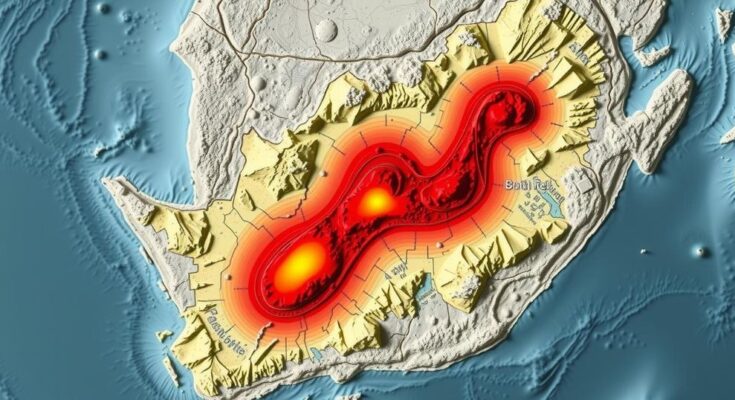A magnitude 5.3 earthquake struck western South Africa on December 22, 2024, at 2:51 a.m. local time. The epicenter was located 101 km west of Brandvlei, with tremors felt in Cape Town. No casualties or property damage have been reported, but local authorities will conduct assessments in the vicinity.
On December 22, 2024, a moderate earthquake struck the western region of South Africa, sending tremors throughout multiple areas, including the coastal city of Cape Town. The United States Geological Survey (USGS) recorded the earthquake, which had a magnitude of 5.3, occurring at 2:51 a.m. local time, 101 kilometers west of Brandvlei, a modest town located in the Northern Cape Province. The epicenter of the quake was determined to be at a latitude of 30.45 degrees south and a longitude of 19.44 degrees east, with a depth of 10 kilometers. Despite the strength of the tremors felt in Cape Town, there have been no official reports of casualties or damage to property at this time. Local authorities have indicated their intention to conduct comprehensive assessments in the affected areas to ascertain the earthquake’s impact.
Earthquakes are natural geological phenomena that occur due to the movement of tectonic plates beneath the Earth’s surface. South Africa is not typically associated with significant seismic activity; however, it does experience moderate quakes occasionally. The occurrence of such an earthquake, especially one that is felt in urban centers like Cape Town, can raise concerns regarding infrastructure stability and public safety. Continuous monitoring and advancements in seismic research play a crucial role in understanding and mitigating the effects of these natural occurrences.
In conclusion, the recent earthquake that struck western South Africa has raised awareness of the potential for seismic activity in the region, even though no casualties or extensive damage have been reported thus far. It is essential for local authorities to remain vigilant and conduct thorough evaluations to ensure public safety and preparedness for future incidents. This event underscores the importance of geological monitoring and community awareness in managing the risks associated with earthquakes.
Original Source: www.bssnews.net




